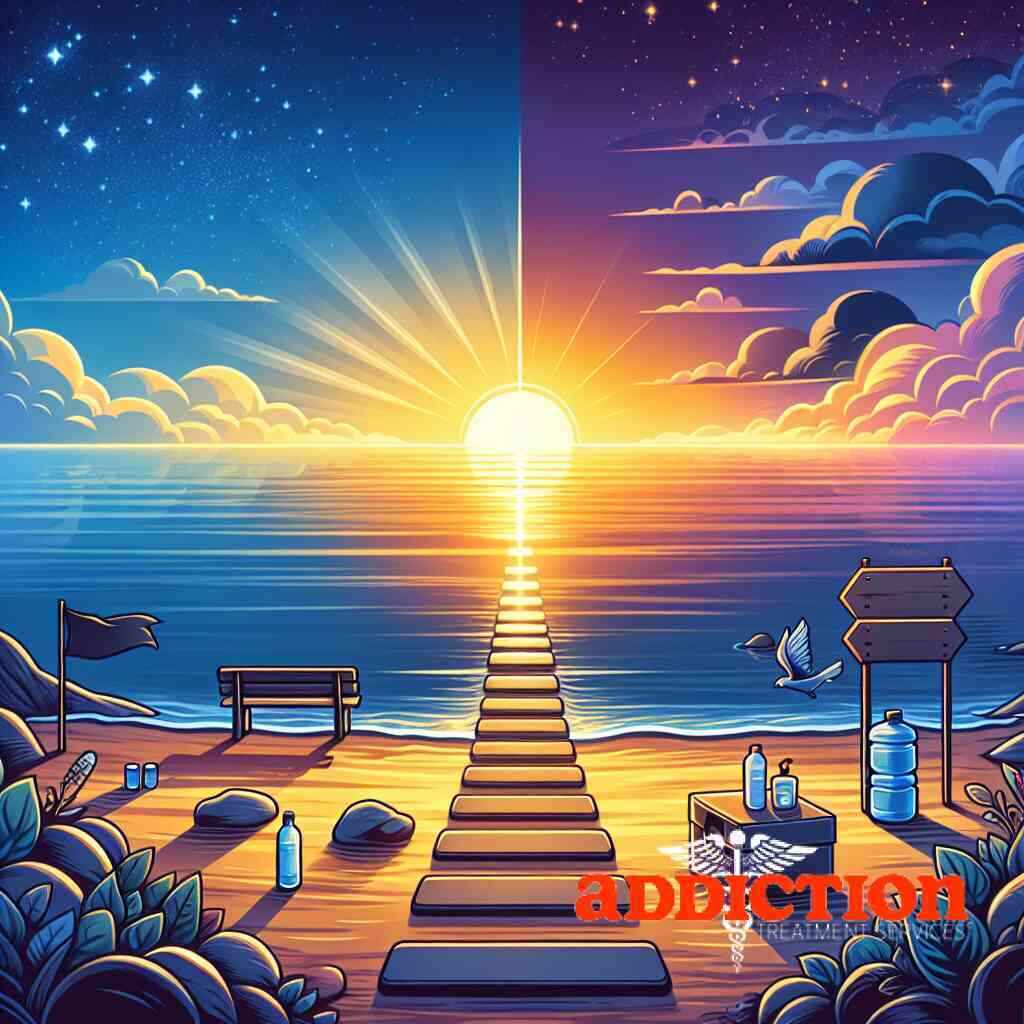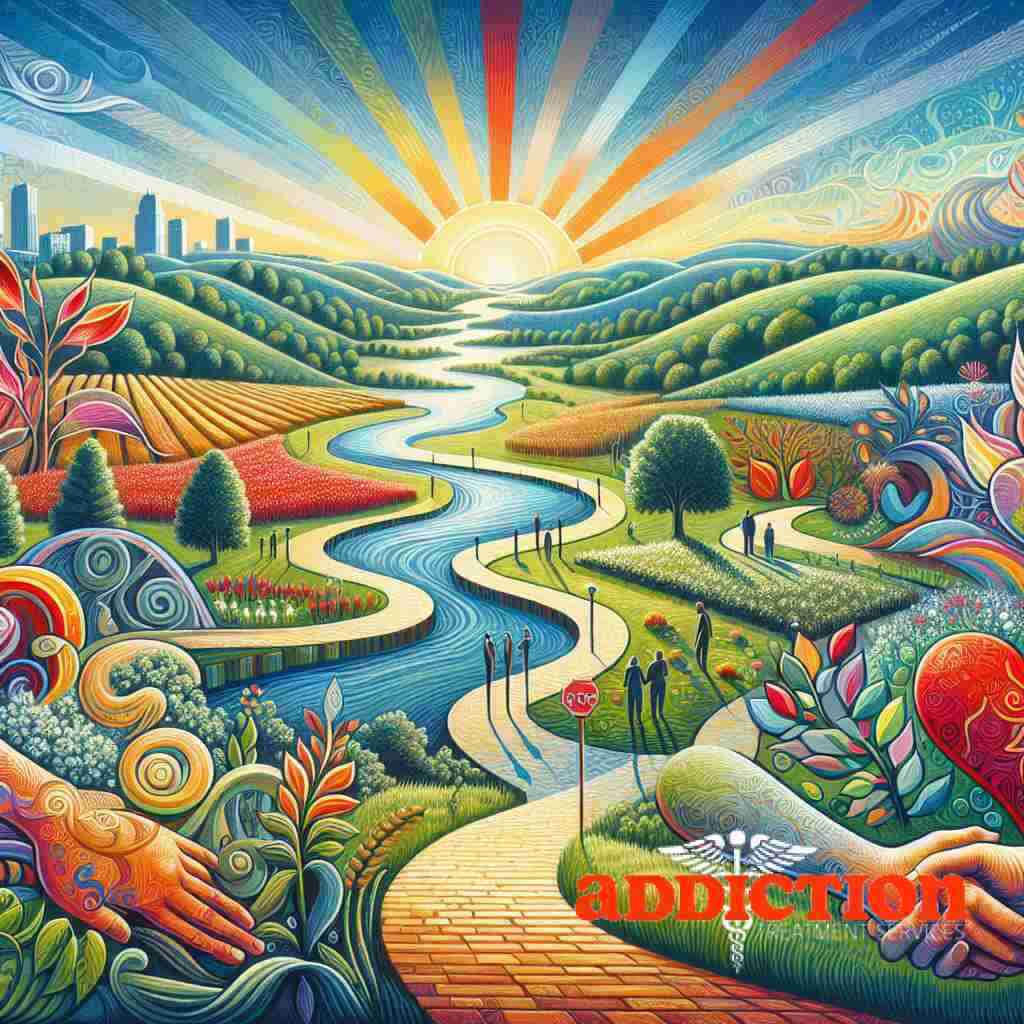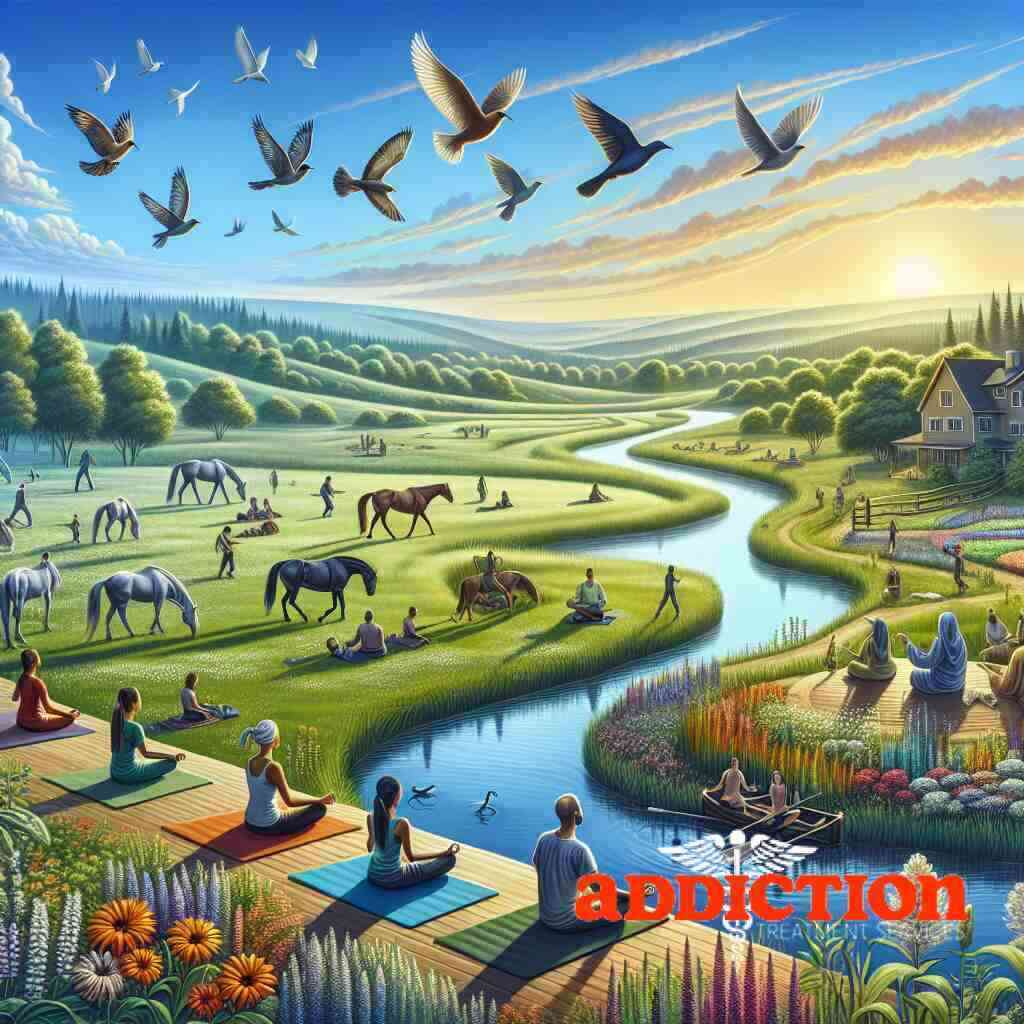 Posted On: 08/19/2024
Posted On: 08/19/2024Introduction to the Battle Within
Understanding Addiction
Addiction is a complex condition, often misunderstood as a lack of willpower or moral failing. However, it’s much more than that. It’s a chronic disorder involving brain chemistry, environmental factors, and personal experiences. Addiction hijacks the brain, altering how it processes pleasure, making substance use or certain behaviors compulsive despite harmful consequences. This struggle is deeply personal and varies widely among individuals. By understanding cross-addiction and dependence, we can begin to see how intertwined the pathways of addictive behaviors really are, shedding light on the importance of targeted treatment and intervention.
The Emotional Rollercoaster of Substance Dependence
The emotional experience of addiction is akin to being on a never-ending rollercoaster. Initially, there’s often a sense of relief or euphoria that comes from using the substance or engaging in the behavior. However, this is quickly replaced by guilt, shame, and despair as the effects wear off and the reality of the situation sets in. People with an addiction may feel trapped by their dependency, oscillating between wanting to quit and fearing the loss of the only coping mechanism they know. This emotional turmoil is exacerbated by the physical side effects of the addiction, from withdrawal symptoms to long-term health impacts, creating a cycle that’s challenging to break.
Why This Journey Feels So Isolating
Addiction often leads individuals down a path of isolation. As the substance use or behavior escalates, it begins to consume the person’s life, pushing away hobbies, interests, and even loved ones. The stigma surrounding addiction further deepens this isolation, as many feel judged or misunderstood by society and sometimes even by their own families. This sense of loneliness can make the addiction feel even more overwhelming as if carrying a weight that no one else can see or understand. It’s a journey that feels uniquely solitary, even though millions are walking a similar path. Finding addiction help services near me can be a crucial first step in breaking this isolation, offering a beacon of hope and support for those ready to start their recovery journey.
Recognizing the Signs of Addiction
Physical Effects of Drug Addiction
The physical toll that addiction takes on a body is profound and multifaceted. Those in the throes of addiction may find themselves grappling with a wide range of symptoms, from drastic weight changes to disruptions in sleep patterns. Physical dependence manifests in many ways, including tolerance (needing more of the substance to achieve the same effect) and withdrawal symptoms when substance use is reduced or stopped. These withdrawal symptoms can be intense, varying from shakes and nausea to more severe health risks like seizures, highlighting the body’s reliance on the substance. Engaging with Addiction Treatment Centers is a critical step for individuals seeking support to navigate and overcome these physical challenges.
Psychological Effects of Substance Abuse
Substance abuse doesn’t only ravage the physical body; its impact on mental health can be just as devastating. Users may experience a wide range of psychological effects, including anxiety, depression, mood swings, and paranoia. The escapism provided by drugs or alcohol often masks underlying mental health issues, which can worsen over time if untreated. This complex interplay between addiction and mental health underscores the necessity of integrated treatment approaches that address both aspects comprehensively. Resources like the Addiction Treatment Blog offer invaluable insights into understanding and tackling these psychological challenges head-on.
Behavioral Changes and Warning Signs
The behavioral changes in someone battling addiction can sometimes be the most apparent indicators of their struggle. Signs can include deteriorating performance at work or school, withdrawing from family and friends, neglecting hobbies or responsibilities, and engaging in risky behaviors. Another significant warning sign is a noticeable shift in the individual’s social circles, gravitating towards people who encourage substance use. Recognizing these signs early can be crucial for getting help. The act of reaching out for assistance, whether it be searching for “Addiction Treatment Services Near Me” or involving a loved one in the process, is a brave first step towards recovery. Prompt intervention can often mitigate the severity of addiction’s impact, paving the way for a more successful treatment outcome.
The Vicious Cycle of Cravings
How Cravings Fuel Substance Misuse
Cravings are an intense, consuming desire for the substance an individual is addicted to, acting as a catalyst for continuous substance misuse. When someone experiences a craving, it feels as though every fiber of their being is demanding the substance. This overpowering need can seem impossible to ignore or overcome, driving the person deeper into the cycle of addiction. These cravings are not just psychological but are deeply rooted in the brain’s altered chemistry due to ongoing substance abuse. The brain, having adapted to the presence of the substance, sends signals that are interpreted as an urgent need for that substance to function or feel normal. This biochemical tug-of-war creates a scenario where the person feels they have little to no control over their actions, resulting in repeated substance misuse to quell the cravings.
Coping Strategies Against Overwhelming Urges
Battling cravings is a monumental part of overcoming addiction, necessitating a repertoire of coping strategies to aid in resisting these powerful urges. One foundational approach is mindfulness and meditation, techniques that help individuals remain present and avoid succumbing to the pull of cravings. Additionally, relapse prevention tips in New Jersey emphasize the importance of creating a supportive network of friends, family, and professionals. This network can offer encouragement, understanding, and practical support in moments of weakness. Structured hobbies and physical activities can also serve as a distraction, providing a sense of fulfillment and accomplishment that can replace the false sense of satisfaction offered by substance abuse. Importantly, seeking professional help and employing therapeutic interventions are often critical steps in developing effective coping mechanisms against these overwhelming urges.
Stages of Addiction and the Craving Spiral
Understanding the stages of addiction is crucial in comprehending how cravings escalate and perpetuate the cycle of substance misuse. Initially, use might be experimental or recreational, but for some, it can evolve into regular use, risky use, and then dependence. As a person moves through these stages, cravings become more frequent and more intense, often triggered by stress, environment, or even memories associated with substance use. This craving spiral can lead to increased tolerance, where higher amounts of the substance are required to satisfy the craving, further deepening the addiction. Acknowledging these stages illuminates the path toward breaking the cycle, highlighting that early intervention and comprehensive treatment, integrating both addiction help services and coping strategies, are essential in mitigating the intensity and frequency of cravings.
The Role of Mental Health in Addiction

Addiction and Mental Health: Tangled Webs
The interplay between addiction and mental health represents a complex relationship, one that underscores the notion that neither exists in a vacuum. Substance use disorders often go hand-in-hand with mental health conditions such as depression, anxiety, and post-traumatic stress disorder (PTSD). This bidirectional relationship means that not only can mental health issues lead to substance misuse as a form of self-medication, but prolonged substance abuse can also exacerbate or trigger new mental health disorders. For individuals facing this tangled web, comprehensive treatment that addresses both addiction and concurrent mental health issues is crucial.
Understanding the root causes of addiction requires a deep dive into the individual’s mental health history. It’s not uncommon for those struggling with addiction to have a background marked by trauma or unresolved emotional pain. Substance use presents a temporary escape from these issues, creating a cycle where mental health deteriorates as addiction progresses, further complicating recovery efforts.
Dealing with Dual Diagnosis
Dual diagnosis refers to the co-occurrence of substance use disorders and mental health conditions, a scenario that presents unique challenges in treatment. When an individual is diagnosed with both, treatment must be integrated to address each issue concurrently. Failure to do so can lead to a situation where untreated mental health issues become a trigger for relapse into substance use or vice versa. Treatment programs specializing in dual diagnosis employ a variety of therapeutic approaches, including medication-assisted treatment, cognitive-behavioral therapy, and support groups designed to address the wide range of issues these individuals face.
Navigating the complexities of dual diagnosis requires specialized knowledge and skills, highlighting the importance of seeking addiction help services that offer comprehensive care. It’s not just about treating the addiction alone but understanding and addressing the underlying mental health issues that contribute to the addictive behaviors. This integrated approach fosters a pathway for healing that acknowledges the full spectrum of challenges the individual is facing.
The Importance of Mental Health Services in Recovery
The role of mental health services in the recovery process cannot be overstated. Access to quality mental health care is a critical element of successful addiction treatment programs. These services not only help in addressing the mental health conditions that may accompany addiction but also equip individuals with coping strategies to deal with stress, anxiety, and other triggers for substance use. Through therapy sessions, group discussions, and sometimes pharmacological interventions, individuals learn to navigate life without reliance on substances.
Moreover, mental health services offer a form of support that reinforces the individual’s value and worth, countering the feelings of shame and isolation that often accompany addiction. By prioritizing mental health as part of the recovery process, treatment programs provide a more holistic approach, one that views recovery not just as abstinence from substance use but as a journey towards overall mental, emotional, and physical wellness. Engaging with professionals in environments like Reco Intensive can be transformative, offering hope and tangible strategies for individuals looking to rebuild their lives.
In the fight against addiction, the emphasis on mental health services acknowledges the profound interconnectedness of mental well-being and substance use disorders. By addressing both, individuals are given the tools and support necessary to navigate the complex journey of recovery, with the ultimate goal of achieving a balanced and fulfilling life free from the chains of addiction.
Pathways to Recovery
Starting with Detoxification Services
The first and often most critical step on the journey to recovery from addiction is starting with detoxification services. Detoxification, or detox, is the process of allowing the body to remove the drugs or substances from its system, often while managing the symptoms of withdrawal in a safe and medically supervised environment. This phase can be intimidating, given the physical and psychological effects of substance abuse, but it is essential for clearing the path toward lasting recovery.
Detoxification services provide the foundation for the healing process, addressing the immediate physical challenges of stopping substance use. It’s important to understand that detox is not a cure for addiction but rather the first step in a comprehensive treatment plan that considers both the psychological and behavioral aspects of addiction. Facilities offering detoxification services are equipped with medical professionals who can provide medication-assisted treatment to ease withdrawal symptoms and ensure that the process is as comfortable as possible for the individual.
The Transition to Residential Treatment or Outpatient Care
Following detoxification, the next step in the recovery journey involves transitioning to either residential treatment or outpatient care. The decision between these two pathways largely depends on the individual’s specific situation, including the severity of their addiction, personal responsibilities, and the level of support they have outside of treatment.
Residential treatment programs offer a structured environment where individuals live at the facility while undergoing intensive therapy and counseling. This setting is beneficial for individuals with severe addictions or those who require a high level of medical and emotional support. On the other hand, outpatient care allows individuals to live at home while attending treatment sessions at the facility. This option might be more suitable for those with milder forms of addiction or individuals who need to maintain their work or family responsibilities during treatment.
Both pathways aim to equip individuals with the tools they need to understand their addiction, address underlying issues, and develop healthy coping mechanisms. They also provide a supportive community, be it fellow residents or outpatient group members, facilitating a sense of belonging and shared purpose in recovery.
Holistic and Behavioral Health Services for Long-Term Recovery
For a recovery to be truly effective and long-lasting, treatment must extend beyond the physical aspects of addiction and address the individual as a whole. Holistic and behavioral health services are critical components of comprehensive addiction treatment programs, offering a more well-rounded approach to recovery.
Holistic services may include yoga, meditation, acupuncture, and nutrition counseling, all of which aim to improve overall well-being and reduce stress. These practices can enhance traditional therapy by helping individuals find balance, manage cravings, and connect with themselves on a deeper level.
Behavioral health services, on the other hand, focus on modifying harmful behaviors and thought patterns through evidence-based therapies such as Cognitive Behavioral Therapy (CBT) and Dialectical Behavior Therapy (DBT). These therapies are instrumental in helping individuals understand the root causes of their addiction, improve their emotional regulation, and develop effective strategies for dealing with life’s challenges without resorting to substance use.
Together, holistic and behavioral health services create a comprehensive treatment plan that addresses all aspects of an individual’s life affected by addiction. They play a pivotal role in not only achieving sobriety but also in maintaining it through the development of a healthier, more fulfilling lifestyle. Access to recovery support services can make a significant difference in this phase, providing ongoing assistance and commitment to personal growth beyond initial treatment.
By integrating these diverse pathways to recovery, individuals are better positioned to navigate the complexities of overcoming addiction, equipped with a broad spectrum of tools and resources to support their long-term health and well-being.
Living with Addiction: Daily Struggles and Triumphs
Overcoming Substance Abuse Day by Day
Living with addiction is a constant battle, where each day presents its unique challenges and opportunities for growth. For individuals grappling with substance abuse, the journey toward sobriety is marked by small victories and occasional setbacks. Every day requires a renewed commitment to resist cravings, avoid triggers, and adhere to the strategies learned in treatment. This daily struggle often involves a comprehensive understanding of one’s addiction, recognizing personal warning signs, and the proactive management of stressors that might lead to relapse.
Utilizing support networks, such as family, friends, and peer groups, plays an instrumental role in navigating the complexities of day-to-day life. These networks encourage and and share strategies for coping with temptation and offer a non-judgmental space to discuss fears and celebrate achievements. They are engaging in aftercare programs, including therapy and Narcotics Anonymous Meetings, which further aid in sustaining motivation and accountability, reinforcing the resolve to remain sober.
The essence of overcoming substance abuse each day lies in choosing recovery repeatedly and and embracing the journey’s inherent ups and downs. It’s about acknowledging progress, learning from lapses, and consistently moving forward, inspired by the possibility of a healthier, more fulfilling life beyond addiction.
Relapse Prevention: Staying Ahead of the Game
Relapse prevention forms the cornerstone of the recovery process, equipping individuals with strategies to manage the complexities of addiction in the long term. Understanding that relapse can be part of the recovery journey, it’s vital to develop a personalized relapse prevention plan that considers specific triggers, warning signs, and effective coping mechanisms.
Key strategies include identifying high-risk situations and creating actionable plans to avoid or confront them, developing healthy stress management techniques, and maintaining a balanced lifestyle. Regular participation in recovery groups and therapy sessions is crucial for reinforcing coping skills and fostering a supportive community.
Empowerment comes from education and self-awareness; staying informed about the processes underlying addiction and recovery can help individuals anticipate challenges and respond proactively. Utilizing resources like the Delray Beach Intensive Outpatient Program can provide continuous support and guidance, anchoring individuals in their resolve to maintain sobriety.
Recovery Support Services: A Pillar of Strength
Recovery support services offer a vital source of assistance and encouragement for individuals navigating the path of recovery. These services, ranging from 12-step programs to non-traditional support groups, provide a community of peers who understand the challenges of overcoming addiction firsthand.
Such support networks extend beyond formal meetings; they foster connections, share resources, and offer encouragement throughout the recovery journey. Engaging with these communities can help lessen the feelings of isolation often associated with addiction, allowing individuals to experience solidarity and understanding from those on similar paths.
Recovery apps, like those recommended in the list of Recovery Apps for Addiction in Texas, complement traditional support services by providing tools and resources accessible at any time. These digital platforms can help track progress, manage triggers, and connect users with a broader support network, reinforcing daily recovery efforts.
Integral to sustained recovery is the continued engagement with these support services. Whether through face-to-face meetings, digital platforms, or community events, these services embody a pillar of strength, offering guidance, companionship, and hope as individuals work towards rebuilding their lives in sobriety.
Making the Decision: Seeking Treatment for Addiction
When and How to Look for Addiction Treatment Services Near You
Deciding to seek treatment for addiction marks a pivotal moment in one’s journey toward recovery. This decision often comes after acknowledging the profound impact of addiction on lifestyle and personal well-being. The process of finding addiction treatment services near you begins with research and evaluation. Start by exploring a comprehensive addiction treatment services directory that lists reputable treatment facilities across the country. It’s essential to consider the types of treatment programs offered, such as detoxification services, residential treatment, outpatient care, and specialized programs like medication-assisted treatment.
When searching for the right treatment facility, prioritize those that perform a thorough assessment of your medical, psychological, and social needs. This holistic approach ensures the treatment plan addresses all facets of your addiction. Look for facilities with accreditation and qualified professionals who employ evidence-based practices. Utilizing resources like Addiction Treatment Services can simplify this critical step, offering guidance and support as you navigate the myriad options for addiction recovery.
Involving Family Members in the Recovery Process
Family plays a crucial role in the recovery process, offering emotional support, understanding, and motivation. Involving family members starts with open communication about the decision to seek treatment and how they can contribute positively to this journey. Many addiction treatment centers encourage family participation through therapy sessions, educational programs, and support groups. These initiatives help family members understand the nature of addiction, recognize their loved one’s struggles, and learn effective ways to support them without enabling addictive behaviors.
Engaging family members fosters a supportive environment crucial for recovery. It helps repair relationships strained by addiction, promoting healing and understanding within the family unit. Encouraging loved ones to attend Alcoholics Anonymous Meetings or similar support gatherings can provide them with insights and tools to navigate the challenges of addiction recovery as a cohesive unit.
The Role of Early Intervention and Intensive Outpatient Programs
Early intervention in addiction treatment can significantly influence the recovery trajectory, preventing the escalation of substance use disorders and minimizing the psychological, social, and health consequences. Recognizing the signs of addiction and seeking help promptly is vital. Intensive Outpatient Programs (IOPs) play a crucial role in early intervention strategies. IOPs provide structured treatment and support while allowing individuals to continue living at home and maintain their daily responsibilities. This flexibility makes early intervention more accessible and less disruptive to one’s life.
IOPs blend individual counseling, group therapy, and educational sessions focused on substance misuse, coping strategies, and relapse prevention. These programs are particularly beneficial for individuals who do not require detoxification or round-the-clock supervision. By emphasizing personal responsibility and active participation in recovery, Intensive Outpatient Programs equip individuals with the tools and strategies needed for long-term sobriety, underscoring the significance of early intervention in the battle against addiction.
Conclusion: A Glimmer of Hope on the Horizon
Personal Stories of Addiction and Redemption
Each journey through addiction is deeply personal, marked by battles fought in the quiet corners of the heart and mind. Yet, within these stories of struggle, there lies a powerful testament to human resilience. Personal tales of addiction and redemption shine a beacon of hope for those still navigating the tumultuous waters of substance dependence. They underscore the profound strength found in vulnerability, sharing how hitting rock bottom often serves as the solid foundation upon which a new life is built. These narratives resonate with the raw truth that although addiction may hold one in its grasp, the potential for liberation and transformation exists. Embracing these stories encourages a collective acknowledgment of addiction’s reality while celebrating the possibility of recovery and renewal.
Understanding That Seeking Help is a Sign of Strength
The decision to seek help for addiction is one of the most courageous steps an individual can take. It represents a pivotal moment of recognition- not of defeat, but of strength. Demolishing the stigma surrounding addiction treatment is crucial, as it paves the way for more individuals to embrace recovery without fear of judgment. Acknowledging the need for assistance reveals a desire for a better life, a declaration that one’s current path does not dictate one’s future. Addiction Treatment Services emphasizes the importance of understanding that reaching out is not a sign of weakness but a profound act of self-respect and determination. Encouraging this perspective helps dismantle barriers to treatment, ensuring that support and understanding greet those ready to reclaim their lives from addiction.
Navigating the Recovery Journey Together
Recovery is not a solitary journey. It flourishes within the context of community- a shared expedition where each step forward is propelled by collective support and compassion. The path to overcoming substance misuse is lined with the expertise of treatment professionals, the understanding of peers who have walked similar paths, and the love of friends and family who offer unwavering support. Bringing these pieces together creates a comprehensive approach to recovery, one that addresses not only the physical and psychological facets of addiction but also the emotional and spiritual dimensions. Addiction Treatment Services serves as a compass, guiding individuals to the resources and Addiction Impact on Lifestyle knowledge they need to navigate each stage of their recovery. Through shared experiences and resources, individuals find not just the roadmap out of addiction but the encouragement to persist, even when the journey feels overwhelming.
The road to recovery is fraught with challenges, yet it is imbued with the promise of transformation and rebirth. It begins with the realization that no one is alone in this fight. There is strength in seeking help, hope in the stories of those who have walked this path before, and unwavering support available to guide each step toward a brighter future. As we collectively uplift these truths, we light the way for a future where recovery is accessible and redemption is possible for all who seek it.
Frequently Asked Questions
Question: What treatment options do Addiction Treatment Services offer for individuals struggling with the emotional impact of addiction?
Answer: Addiction Treatment Services recognizes the profound emotional toll that substance use disorders can exert on individuals. We offer a comprehensive range of treatment options tailored to address the unique needs of each person, focusing on both the psychological effects of substance abuse and the underlying emotional issues. Our directory features facilities equipped with specialized programs for medication-assisted treatment, residential treatment, and outpatient care. Each treatment facility provides therapeutic interventions like cognitive-behavioral therapy and support groups, aiming to comprehensively address the emotional, mental, and physical facets of addiction, ensuring a holistic recovery process.
Question: In the “What Does Addiction Feel Like?” blog post, addiction’s isolation aspect is mentioned. How do Addiction Treatment Services cater to those feeling isolated due to their addiction?
Answer: Understanding the profound sense of isolation that can accompany addiction, Addiction Treatment Services places a strong emphasis on community and connectedness in the recovery journey. Through our directory, individuals can find addiction treatment services near them that offer supportive group therapy sessions and family involvement programs. We believe in the power of shared experiences and mutual support. Hence, our listed treatment centers often facilitate the creation of peer support networks, aiming to mitigate the isolation by connecting individuals with others who can relate to their experiences. By prioritizing community-centric approaches, we strive to dismantle the barriers of isolation, fostering an environment of understanding and acceptance.
Question: Can Addiction Treatment Services assist in early intervention for those showing signs of addiction but who are not yet fully dependent?
Answer: Absolutely. Addiction Treatment Services values the significance of early intervention in the battle against substance use disorders. Our directory includes a myriad of treatment facilities offering programs specifically designed for individuals at various stages of addiction, including those not yet fully dependent. These programs range from Intensive Outpatient Programs (IOPs) to more flexible outpatient treatment options, allowing individuals to seek help without disrupting their daily lives. Recognizing the signs of addiction early and accessing our comprehensive resources can prevent the escalation of substance misuse, setting the groundwork for a successful recovery journey.
Question: How do Addiction Treatment Services integrate family members into the recovery process?
Answer: Addiction Treatment Services deeply appreciates the vital role that family members play in the recovery process. We encourage and facilitate their involvement through treatment facilities listed in our directory that offer family therapy sessions and educational programs. These resources are designed to help family members understand the complexity of addiction and substance dependence, providing them with strategies to support their loved ones effectively without enabling addictive behaviors. By promoting open communication and understanding, we aim to heal and strengthen family dynamics, recognizing that family support is paramount in the journey toward sustainable recovery.
Question: What types of relapse prevention strategies do Addiction Treatment Services recommend to those navigating the addiction recovery journey?
Answer: Addiction Treatment Services advocates for a multifaceted approach to relapse prevention, understanding that sustainable recovery requires addressing the triggers and underlying issues contributing to substance abuse. Our directory includes treatment centers that emphasize the development of personalized relapse prevention plans, integrating coping strategies such as mindfulness and stress management techniques, and regular participation in support groups like AA Meetings or NA Meetings. Additionally, we recommend continued engagement with behavioral health services to address any evolving mental health concerns, thereby reinforcing resilience against potential relapses. Our holistic view of recovery emphasizes ongoing support, education, and access to a comprehensive suite of recovery support services, ensuring individuals are well-equipped to manage their daily struggles and triumphs on the path to sobriety.



